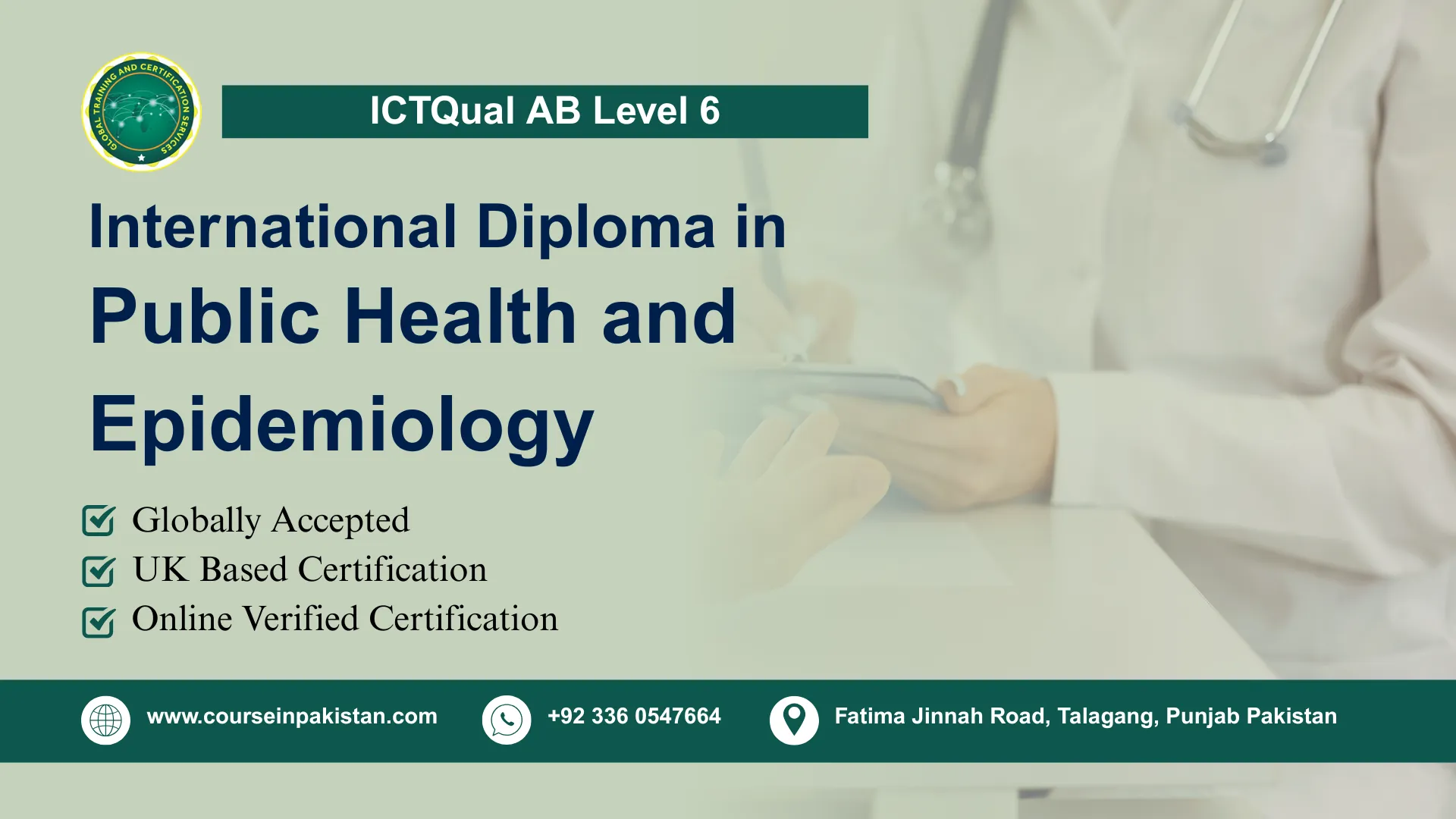
The ICTQual AB Level 6 International Diploma in Public Health and Epidemiology is designed to equip learners with advanced knowledge and practical skills in the fields of public health, disease prevention, and epidemiological research. This comprehensive program covers the principles of population health, health promotion, infectious and non-communicable disease control, health policy, and public health ethics. Learners will gain expertise in designing, analyzing, and interpreting epidemiological studies, enabling them to make informed decisions to improve health outcomes at community, national, and global levels.
This diploma emphasizes evidence-based practice, research methodologies, and professional development in public health and epidemiology. Graduates will be prepared to contribute to healthcare planning, disease surveillance, and health policy implementation while adhering to ethical and regulatory standards. The program is ideal for both fresh graduates aiming to build a strong foundation in public health and experienced professionals seeking to advance their careers in healthcare management, epidemiological research, and public health advisory roles.
Course Overview
The ICTQual AB Level 6 International Diploma in Public Health and Epidemiology is a 360-credit, fully assignment-based qualification that allows learners to study at their own pace from anywhere in the world. This internationally recognized certification is British Council verifiable, MOFA and Embassy attestable, making it highly suitable for job opportunities and Iqama approval. It is designed to accommodate both fresh learners and experienced professionals seeking to advance their careers in public health, epidemiology, healthcare management, and research.
Fresh students are required to complete all 36 mandatory assignments within three years, gaining comprehensive knowledge and practical skills in epidemiology, disease prevention, health promotion, biostatistics, health policy, and community health interventions. Experienced and competent professionals, however, can pursue this certification by submitting verifiable at least six years of relevant experience and demonstrating their expertise through professional discussion meetings with an ICTQual AB approved assessor, enabling them to complete the qualification in a shorter time without completing all mandatory assessments. This flexibility ensures the program is accessible, practical, and career-focused for learners at all stages of their professional journey, providing a credible pathway to advance in public health and epidemiology.
Key Highlights of the Course:
- 360-credit, fully assignment-based diploma allowing flexible, self-paced learning from anywhere in the world
- British Council verifiable, MOFA and Embassy attestable, suitable for job opportunities and Iqama approval
- Comprehensive coverage of epidemiology, public health, biostatistics, health policy, and community health interventions
- Suitable for both fresh students (36 assignments over 3 years) and experienced professionals (short pathway with minimum 6 years of verifiable experience)
- Practical, research-oriented approach to public health and epidemiological problem-solving
Course Benefits
1. Career Advancement
- Access professional roles in public health, epidemiology, healthcare management, and research
- Enhance employability in hospitals, NGOs, government agencies, and international health organizations
2. Flexible Learning
- Study at your own pace from anywhere in the world
- Complete the course through assignment-based assessments or fast-track for experienced professionals
3. Practical and Analytical Skills Development
- Develop skills in research, statistical analysis, and evidence-based decision-making
- Apply epidemiological methods to real-world health problems and community interventions
4. Internationally Recognized Qualification
- British Council verifiable, MOFA and Embassy attestable
- Provides credibility for employment, career progression, and Iqama approval
5. Professional Development
- Enhance leadership, communication, and project management skills in public health settings
- Prepare for higher studies, certifications, or consultancy roles in health and epidemiology
Course Study Units
This qualification, the ICTQual AB Level 6 International Diploma in Public Health & Epidemiology 360 Credits – Three Years, consists of 36 mandatory units.
Year 1: Foundation in Public Health & Epidemiology
- Introduction to Public Health
- Fundamentals of Epidemiology
- Human Anatomy and Physiology for Public Health
- Biostatistics and Health Data Analysis
- Principles of Microbiology and Infection Control
- Health Promotion and Disease Prevention
- Nutrition and Community Health
- Environmental Health and Sustainability
- Health Policy and Systems Overview
- Communication Skills for Health Professionals
- Ethics and Professional Conduct in Public Health
- Introduction to Research Methods in Health Sciences
Year 2: Intermediate Public Health Applications
- Advanced Epidemiology and Study Design
- Infectious Disease Control and Prevention
- Non-Communicable Diseases and Chronic Care Management
- Global Health Issues and Health Systems
- Health Economics and Policy Implementation
- Public Health Surveillance and Monitoring
- Occupational and Environmental Health
- Community Health Assessment and Planning
- Health Informatics and Digital Health Systems
- Programme Evaluation and Impact Assessment
- Leadership and Teamwork in Public Health
- Applied Research Methods in Epidemiology
Year 3: Advanced Specialisation and Professional Application
- Advanced Public Health Interventions
- Clinical Epidemiology and Evidence-Based Practice
- Health Risk Assessment and Management
- Biostatistics for Advanced Research
- Global Health Policy and Strategy Development
- Emergency Preparedness and Disaster Management
- Maternal and Child Health Epidemiology
- Advanced Communicable Disease Control
- Health Communication and Advocacy
- Quality Improvement and Risk Management in Healthcare
- Capstone Research Project / Dissertation
- Professional Practice and Field Placement
Learning Outcomes
Year 1 – Foundation in Public Health & Epidemiology
1. Introduction to Public Health
- Understand the principles, scope, and objectives of public health
- Describe the role of public health in disease prevention and health promotion
- Apply foundational public health knowledge to community and population health settings
2. Fundamentals of Epidemiology
- Explain epidemiological concepts, measures, and study designs
- Analyze patterns of disease occurrence in populations
- Apply epidemiology principles to public health practice
3. Human Anatomy and Physiology for Public Health
- Describe the structure and function of human body systems
- Relate anatomical and physiological knowledge to health outcomes
- Apply understanding to support public health interventions and policies
4. Biostatistics and Health Data Analysis
- Apply statistical methods to analyze health data
- Interpret data for research, surveillance, and decision-making
- Use quantitative tools to support evidence-based public health practices
5. Principles of Microbiology and Infection Control
- Understand microorganisms and their impact on health
- Apply infection control measures in public health and healthcare settings
- Analyze strategies for preventing disease transmission
6. Health Promotion and Disease Prevention
- Develop strategies to promote healthy behaviors in communities
- Apply evidence-based approaches to disease prevention
- Evaluate the effectiveness of health promotion programs
7. Nutrition and Community Health
- Understand principles of nutrition and dietary interventions
- Assess nutritional status and its impact on population health
- Develop community-based nutrition programs to improve health outcomes
8. Environmental Health and Sustainability
- Understand the impact of environmental factors on health
- Apply strategies for environmental risk mitigation and sustainable practices
- Analyze the relationship between environmental policies and community health
9. Health Policy and Systems Overview
- Describe health systems structures and functions
- Understand the development and implementation of health policies
- Analyze policy impact on population health and healthcare delivery
10. Communication Skills for Health Professionals
- Demonstrate effective communication with colleagues, communities, and stakeholders
- Prepare professional reports and presentations in public health contexts
- Apply interpersonal and advocacy skills to health promotion and education
11. Ethics and Professional Conduct in Public Health
- Understand ethical principles and legal frameworks in public health practice
- Apply professional conduct standards in research and practice
- Evaluate ethical dilemmas and make informed decisions
12. Introduction to Research Methods in Health Sciences
- Understand research design, methodology, and evidence-based practice
- Conduct literature reviews and data collection for health studies
- Apply research principles to inform public health decisions
Year 2 – Intermediate Public Health Applications
13. Advanced Epidemiology and Study Design
- Design and critically evaluate epidemiological studies
- Analyze data to identify disease trends and risk factors
- Apply advanced epidemiological methods to public health research
14. Infectious Disease Control and Prevention
- Understand epidemiology and transmission of infectious diseases
- Apply prevention, surveillance, and control measures
- Evaluate public health strategies for outbreak management
15. Non-Communicable Diseases and Chronic Care Management
- Analyze prevalence and risk factors for chronic diseases
- Develop strategies for prevention and long-term care
- Apply evidence-based interventions to reduce disease burden
16. Global Health Issues and Health Systems
- Understand international health challenges and global disease patterns
- Analyze health system structures and global healthcare policies
- Develop strategies to address global health disparities
17. Health Economics and Policy Implementation
- Apply economic principles to healthcare and public health decisions
- Analyze the cost-effectiveness of health programs
- Evaluate policy implementation and impact on population health
18. Public Health Surveillance and Monitoring
- Conduct health surveillance and monitor disease trends
- Use data to inform public health interventions and planning
- Develop indicators and reporting systems for population health
19. Occupational and Environmental Health
- Assess occupational and environmental risks to health
- Develop strategies for workplace health and safety
- Apply public health principles to environmental and occupational settings
20. Community Health Assessment and Planning
- Conduct community health needs assessments
- Plan and implement targeted health interventions
- Evaluate the effectiveness of community-based health programs
21. Health Informatics and Digital Health Systems
- Apply digital technologies for health data management
- Analyze electronic health records and public health information systems
- Use health informatics to improve population health outcomes
22. Programme Evaluation and Impact Assessment
- Evaluate public health programs using qualitative and quantitative methods
- Measure outcomes, impact, and effectiveness of interventions
- Provide recommendations for program improvement
23. Leadership and Teamwork in Public Health
- Develop leadership and collaborative skills in multidisciplinary teams
- Manage projects and resources in public health settings
- Promote professional development and effective team communication
24. Applied Research Methods in Epidemiology
- Apply research methods to epidemiological studies
- Collect, analyze, and interpret data for public health decision-making
- Conduct studies in accordance with ethical and methodological standards
Year 3 – Advanced Specialisation and Professional Application
25. Advanced Public Health Interventions
- Design and implement advanced population-level health interventions
- Evaluate outcomes and adjust strategies for maximum impact
- Integrate evidence-based practices into intervention planning
26. Clinical Epidemiology and Evidence-Based Practice
- Apply epidemiological principles to clinical decision-making
- Conduct critical appraisal of research for healthcare practice
- Implement evidence-based guidelines in public health settings
27. Health Risk Assessment and Management
- Identify and assess health risks at population and community levels
- Develop strategies to mitigate and manage health risks
- Apply risk assessment frameworks in public health planning
28. Biostatistics for Advanced Research
- Conduct complex statistical analyses for public health research
- Interpret advanced biostatistical results to guide decisions
- Apply statistical tools for epidemiological and clinical studies
29. Global Health Policy and Strategy Development
- Develop policies and strategies to address global health challenges
- Evaluate the impact of international health regulations and initiatives
- Apply strategic planning to improve health systems and outcomes
30. Emergency Preparedness and Disaster Management
- Plan and implement emergency preparedness strategies
- Manage public health responses to disasters and epidemics
- Evaluate effectiveness of disaster management interventions
31. Maternal and Child Health Epidemiology
- Analyze determinants and outcomes of maternal and child health
- Develop interventions to improve maternal and child health indicators
- Apply epidemiological methods to monitor and evaluate maternal-child programs
32. Advanced Communicable Disease Control
- Implement strategies for control and prevention of infectious diseases
- Conduct outbreak investigations and epidemiological surveillance
- Apply modern techniques for disease monitoring and intervention
33. Health Communication and Advocacy
- Develop public health campaigns and health promotion strategies
- Apply communication tools to influence behavior and policy
- Advocate for population health initiatives and policy changes
34. Quality Improvement and Risk Management in Healthcare
- Implement quality improvement frameworks in healthcare and public health
- Identify and manage risks in health service delivery
- Monitor performance to ensure safety, efficiency, and effectiveness
35. Capstone Research Project / Dissertation
- Conduct independent research addressing a public health or epidemiology issue
- Apply research methodology and analytical skills to real-world problems
- Present findings in structured reports and professional presentations
36. Professional Practice and Field Placement
- Demonstrate practical competence in public health and epidemiology settings
- Apply theoretical knowledge to real-world community, hospital, or research environments
- Reflect on professional development and integrate feedback for career growth
Who is This Course For?
The ideal learner for this course is someone who:
- Has a strong interest in public health, epidemiology, and healthcare research
- Wants to develop practical, analytical, and evidence-based skills for population health management
- Seeks career advancement in hospitals, NGOs, government agencies, or global health organizations
- Is motivated to work on disease prevention, health promotion, and public health policy implementation
- Can manage self-paced, assignment-based learning and apply knowledge to real-world health challenges
Future Progression
Graduates of this course can pursue:
- Specialist and leadership roles in public health departments, epidemiology units, and health policy organizations
- Careers in health data analysis, disease surveillance, and community health management
- Opportunities in international health agencies, NGOs, and research institutions
- Consultancy or advisory roles in healthcare planning, epidemiology studies, and public health interventions
- Advanced studies, including Master’s programs or research degrees in public health, epidemiology, or health policy
Academic Pathways:
- Learners completing this diploma may continue to:
- Master’s programs in Public Health (MPH), Epidemiology, Health Policy, or Global Health
- Professional certifications in Health Data Analytics, Disease Control, or Health Program Management
- Postgraduate diplomas or short courses in Biostatistics, Community Health, or Health Leadership
- Research-based programs or PhD studies focusing on population health, epidemiology, or health systems
Conclusion
The ICTQual AB Level 6 International Diploma in Public Health & Epidemiology provides learners with a comprehensive understanding of population health, disease prevention, epidemiological research, and health policy implementation. Graduates gain practical and analytical skills to design, implement, and evaluate public health programs, making them valuable contributors to healthcare systems, NGOs, and research organizations globally. This internationally recognized, verifiable, and attestable qualification enhances career opportunities, prepares learners for leadership roles, and enables both fresh and experienced professionals to excel in public health and epidemiology.






